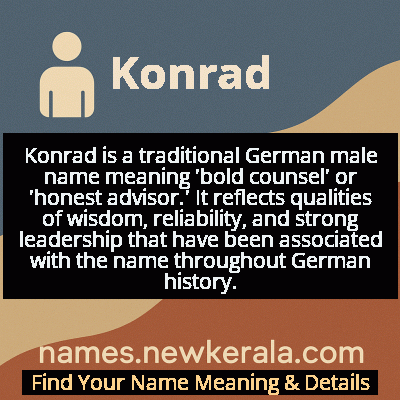Konrad Name Meaning & Details
Origin, Popularity, Numerology Analysis & Name Meaning of Konrad
Discover the origin, meaning, and cultural significance of the name KONRAD. Delve into its historical roots and explore the lasting impact it has had on communities and traditions.
Name
Konrad
Gender
Male
Origin
German
Lucky Number
9
Meaning of the Name - Konrad
Konrad is a traditional German male name meaning 'bold counsel' or 'honest advisor.' It reflects qualities of wisdom, reliability, and strong leadership that have been associated with the name throughout German history.
Konrad - Complete Numerology Analysis
Your Numerology Number
Based on Pythagorean Numerology System
Ruling Planet
Mars
Positive Nature
Generous, passionate, energetic, and humanitarian.
Negative Traits
Impulsive, impatient, moody, and can be overly emotional.
Lucky Colours
Red, maroon, scarlet.
Lucky Days
Tuesday.
Lucky Stones
Red coral, garnet.
Harmony Numbers
1, 2, 3, 6.
Best Suited Professions
Military, sports, philanthropy, leadership roles.
What People Like About You
Courage, energy, leadership, generosity.
Famous People Named Konrad
Konrad Adenauer
Statesman
First Chancellor of West Germany who led the country's reconstruction after WWII
Konrad Lorenz
Ethologist
Nobel Prize-winning founder of modern ethology and imprinting theory
Konrad Zuse
Computer scientist
Built the world's first programmable computer and invented the first high-level programming language
Konrad von Hötzendorf
Military commander
Chief of Staff for Austria-Hungary whose military strategies significantly influenced WWI
Name Variations & International Equivalents
Click on blue names to explore their detailed meanings. Gray names with will be available soon.
Cultural & Historical Significance
During the 19th and 20th centuries, Konrad experienced a resurgence as Germans looked to their historical roots for names that embodied national identity and cultural heritage. The name's association with prominent figures like Konrad Adenauer, who led West Germany's post-war reconstruction, reinforced its image of reliable leadership and statesmanship. In contemporary German culture, Konrad represents a bridge between historical tradition and modern values, often chosen by families who appreciate both its noble heritage and its connotations of intellectual strength and moral integrity.
Extended Personality Analysis
Individuals named Konrad are typically perceived as reliable, thoughtful, and possessing strong leadership qualities. They often exhibit a natural authority combined with practical wisdom, making them excellent problem-solvers and trusted advisors in both personal and professional contexts. Konrads tend to be methodical in their approach to challenges, preferring careful analysis over impulsive decisions. Their strong sense of responsibility and loyalty makes them dependable friends and colleagues, though they can sometimes be perceived as reserved or traditional in their outlook.
Many Konrads demonstrate intellectual curiosity and a preference for structured environments where their analytical skills can shine. They often excel in fields requiring strategic thinking, technical expertise, or organizational leadership. While they may not be the most emotionally expressive individuals, they form deep, lasting bonds based on mutual respect and shared values. The combination of their analytical nature and strong ethical compass typically results in individuals who are both competent and principled, capable of navigating complex situations with both intelligence and integrity.
Modern Usage & Popularity
In contemporary Germany and German-speaking countries, Konrad maintains steady popularity as a traditional yet distinctive choice. While not among the top 50 most popular names, it enjoys consistent usage among parents seeking strong, historically significant names with classic appeal. The name has seen a mild resurgence in recent years as part of the trend toward traditional Germanic names, particularly among educated urban families who value cultural heritage. Outside German-speaking regions, Konrad remains relatively uncommon but is occasionally chosen by families with German heritage or those appreciating its strong, intellectual connotations. The name's usage patterns show it's particularly favored by families who value academic achievement and professional success, reflecting its associations with notable scientists, engineers, and leaders who have borne the name.
Symbolic & Spiritual Meanings
Konrad symbolizes wisdom, reliability, and steadfast leadership across multiple dimensions. The name carries strong connotations of intellectual strength and moral integrity, often associated with the archetype of the wise counselor or trusted advisor who provides guidance during challenging times. Symbolically, it represents the bridge between tradition and progress—honoring historical roots while embracing modern challenges and innovations. In metaphorical terms, Konrad embodies the qualities of an oak tree: deep-rooted in tradition, strong in character, and enduring through changing circumstances and seasons. The name also suggests someone who provides stability and direction, much like a lighthouse offering safe passage through turbulent waters, reflecting its original meaning of 'bold counsel' and reliable guidance.

